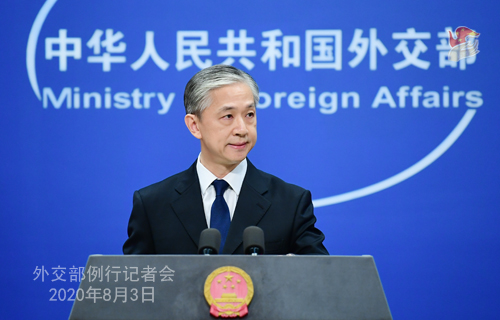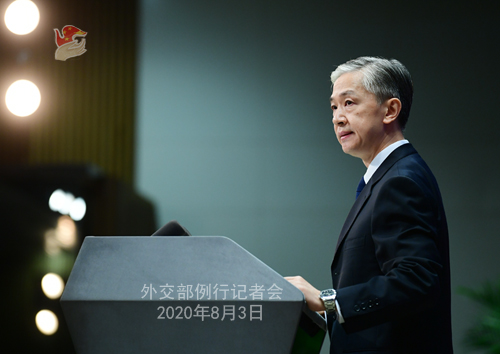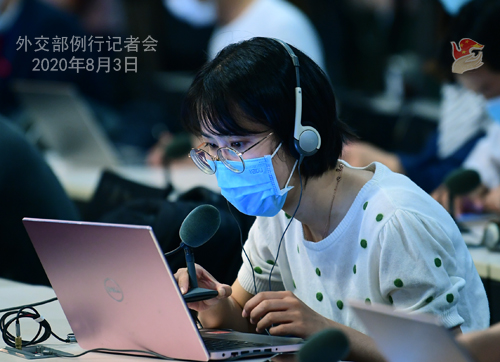| Foreign Ministry Spokesperson Wang Wenbin's Regular Press Conference on August 3, 2020 |
| 2020-08-03 22:34 |
|
New Zealand, citing the Law on Safeguarding National Security in the Hong Kong SAR as an excuse, unilaterally suspended the agreement on surrender of fugitive offenders with the HKSAR. Such politicization of judicial cooperation with Hong Kong constitutes a gross interference in China's internal affairs and a grave violation of international law and basic norms governing international relations, which has seriously damaged the foundation for such cooperation and deviated from its purpose of upholding justice and rule of law. China firmly opposes it. Therefore, China has decided that the Hong Kong SAR will suspend its agreement on surrender of fugitive offenders with New Zealand. At the same time, China has decided that the Hong Kong SAR will suspend its agreement on mutual legal assistance in criminal matters with New Zealand. The Paper: Hong Kong's 7th legislative council election initially scheduled to take place on September 6 will be postponed by a year, Chief Executive Carrie Lam announced amid a new surge in coronavirus cases. A handful of countries have expressed concerns. What is your comment? Wang Wenbin: The Hong Kong SAR Government's decision to postpone the election in the face of the raging pandemic is a justified and necessary step to ensure people's safety and health and a safe, fair and just election. The Hong Kong and Macao Affairs Office of the State Council and the Liaison Office of the Central People's Government in the Hong Kong SAR have all expressed support in their respective statements. Many countries and regions have put off elections due to epidemics and other disasters and the Hong Kong SAR government followed this common practice in making this legitimate, reasonable and lawful decision. I want to stress that Hong Kong is China's special administrative region and the HKSAR's legislative council election is China's local election, thus purely Hong Kong's internal affairs. No foreign government, organization or individual has any right or reason to interfere. Bloomberg: US Secretary of State Mike Pompeo told media on Sunday that the Trump administration will announce measures shortly against "a broad array" of Chinese-owned software deemed to pose national-security risks and in that interview he mentioned TikTok and WeChat. What's the ministry's comment? Wang Wenbin: The US side made this threat against relevant companies with presumption of guilt while presenting no evidence. This violation of market economy rules is no "fairness" and "freedom" as the US chants and only serves to reveal its hypocrisy and double standards. It also runs counter to the WTO principles of openness, fairness, transparency and non-discrimination. China firmly opposes that. We call on certain people in the US to heed the voices of the international community, provide an open, fair, just and non-discriminatory environment for all market entities investing and operating in the US, stop politicizing economic and trade issues, and stop practicing discriminatory and exclusive policies in the name of national security.
Xinhua News Agency: We noted that the 24th session of the China-ROK Joint Economic Committee was held in Qingdao last weekend. This as we understand marks the first face-to-face intergovernmental meeting of economic cooperation mechanism China has held with other countries since COVID-19 broke out. Is China planning to have more such in-person interactions with the ROK going forward? Wang Wenbin: The competent Chinese authority has issued a press release on the 24th meeting of the China-ROK Joint Economic Committee. I want to stress that China and the ROK are important friendly close neighbors and cooperation partners. Since the COVID-19 outbreak, under the guidance of the heads of state of the two countries, China and the ROK are among the first to establish a joint prevention and control cooperation mechanism and a fast-track arrangement, setting a model of international anti-epidemic cooperation and sending out unequivocal positive signal of China and the ROK's firm commitment to bilateral economic and trade relations. This serves as an important exemplar for the recovery and growth of regional and global economic and trade cooperation. China and the ROK will continue to advance cooperation and exchange while maintaining ongoing COVID-19 response in light of respective epidemic situation and the need of developing bilateral relations. AFP: Switzerland foreign minister said in an interview published on Sunday that China is moving away from the path of openness. He said that the human rights violations are on the increase. He also expressed concerns about the new national security law in Hong Kong. Do you have any comment? Wang Wenbin: Such remarks are groundless and not constructive. As we've repeatedly stressed, Hong Kong affairs are China's internal affairs where no foreign country has any right to interfere. The Law on Safeguarding National Security in Hong Kong will ensure the steady and sustained implementation of "one country, two systems" along the legal track. When it comes to China's human rights conditions, the Chinese people are in the best position to judge and basic facts must be respected. China is committed to development through opening-up. Financial enterprises like Credit Suisse are among the first to benefit from China's new round of financial market opening-up. This year marks the 70th anniversary of China-Switzerland diplomatic relations. Over the past seven decades, with concerted efforts, bilateral relations have come a long way and realized mutual benefit. The most fundamental thing we've learned from this progress is that equality and mutual respect must be adhered to. We hope the Swiss side will cherish the sound momentum in bilateral relations and abide by basic norms governing international relations. The Global Times: On July 31, the US Department of State and Department of Treasury announced sanctions on the Xinjiang Production and Construction Corps (XPCC) and two current or former government officials. Secretary of State Pompeo also criticized China's Xinjiang policies in a statement. What is your comment? Wang Wenbin: The US action is a gross interference in China's internal affairs and a grave violation of basic norms governing international relations. China firmly opposes and strongly condemns it. Xinjiang-related issues are never about human rights, ethnicity or religion. They are about counter-terrorism and anti-separatism. Xinjiang affairs are purely China's internal affairs. The US has no right and no ground to interfere. The XPCC has made important contributions to promoting Xinjiang's development, ethnic unity, social stability and border security, living in harmony with all ethnic groups as a friendly and supportive companion. The US allegation is nothing but rumor-mongering and mud-slinging. The Chinese government is resolute in upholding its sovereignty, security and development interests, in fighting violent terrorist, separatist and religious extremist forces, and in opposing any foreign interference in Xinjiang affairs and China's other internal affairs. We urge the US side to immediately withdraw its wrong decision and stop saying or doing anything that interferes in China's internal affairs and damages China's interests. If the US side is bent on behaving like this, the Chinese side will resolutely fight back.
Shenzhen TV: US Secretary of State Mike Pompeo in a statement on July 31 again accused China of conducting surveillance against the Uighurs and other ethnic minorities. What's your response? Wang Wenbin: Pompeo's allegation has no factual basis at all. It is a common international practice to use modern scientific and technological products and big data to improve social governance, and the US is no exception. The installation of cameras in public places in accordance with law in Xinjiang doesn't target any specific ethnicity and it aims to improve social governance and prevent and fight crimes. This measure has been widely supported by people of all ethnic groups as it makes society safer. Speaking of surveillance, the US has long been criticized for its massive surveillance using high-techs. According to US media reports, in 2017 the US government demanded the deployment of facial recognition technology at 20 airports across the country. The New York police have built a city surveillance system, with surveillance devices for pedestrians and vehicles throughout the city and the tracking of individual cellphone data. Texas is home to eight secretive surveillance centers, supported jointly by federal, state and local law enforcement departments, who share intelligence to monitor social media and online forums. A report released by the United States Government Accountability Office (GAO) on June 4, 2019 showed that the FBI's FACE Services, even without license, has access to over 640 million face photos available in all searchable repositories. According to a report released by Georgetown University, half of American adults, or more than 117 million people, are enrolled in a law enforcement face recognition network, and African Americans are most likely to be singled out. Moreover, relevant US agencies have long been conducting massive, organized and indiscriminate cyber theft, surveillance and attack against foreign governments, companies and individuals in breach of international law and basic norms of international relations. This has been a well-known fact to all. Pompeo and his likes vilified Xinjiang's deployment of modern technology for better social governance as surveillance targeting Uighurs and other ethnic minorities. Such remarks are nothing better than malicious slanders. Such attempt to sabotage prosperity and stability in Xinjiang and seek pretext to have a hand in China's internal affairs is doomed to fail. Reuters: US President Donald Trump has agreed to give China's ByteDance 45 days to negotiate a sale of TikTok's US, New Zealand, Australia and Canada operations to Microsoft. How do you comment about this? Another question, ByteDance accused Facebook of smearing and plagiarizing it, and Chinese state media have accused Facebook of working with Washington to launch a witchhunt on ByteDance. How do you comment about this? Wang Wenbin: On your first question, I am not aware of the situation. We also don't comment on the specific business activity of the relevant companies. As for what was said by the relevant company, I have not seen the report. As you know, we usually do not respond specifically to reports or remarks made by companies, media, experts or scholars. I refer you to the relevant business. Bloomberg: My question relates to an article written by the deputy German foreign minister Michael Roth in Der Spiegel who said that Europe should safeguard its security by choosing domestic suppliers for 5G networks instead of Huawei's. Could you comment on that please? Wang Wenbin: We hope relevant party will provide an open, fair, just and non-discriminatory environment for the investment and operation of businesses from all countries and refrain from politicizing economic and trade issues and adopting discriminatory and exclusive measures by abusing the concept of national security.
|
| |||||||||||||||
|
|||||||||||||||





